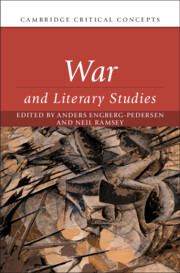Book contents
- War and Literary Studies
- Cambridge Critical Concepts
- War and Literary Studies
- Copyright page
- Contents
- Figures
- Contributors
- Acknowledgments
- Introduction: War, Literature, and the History of Knowledge
- Part I Origins and Theories
- Part II Foundational Concepts
- Chapter 8 War and Language
- Chapter 9 War and Aesthetics
- Chapter 10 War and Historicity
- Chapter 11 War and Sensation
- Chapter 12 War and Civilians
- Chapter 13 War and Trauma
- Chapter 14 War and Religion
- Chapter 15 War and Gender
- Part III Emerging Concepts
- Index
Chapter 8 - War and Language
from Part II - Foundational Concepts
Published online by Cambridge University Press: 15 January 2023
- War and Literary Studies
- Cambridge Critical Concepts
- War and Literary Studies
- Copyright page
- Contents
- Figures
- Contributors
- Acknowledgments
- Introduction: War, Literature, and the History of Knowledge
- Part I Origins and Theories
- Part II Foundational Concepts
- Chapter 8 War and Language
- Chapter 9 War and Aesthetics
- Chapter 10 War and Historicity
- Chapter 11 War and Sensation
- Chapter 12 War and Civilians
- Chapter 13 War and Trauma
- Chapter 14 War and Religion
- Chapter 15 War and Gender
- Part III Emerging Concepts
- Index
Summary
War and language have a symbiotic relationship. On the one hand, wars are carried on and remembered through a proliferation of linguistic discourse. On the other, language is often a site of violent action and the battlefield of fierce struggles for power. This chapter explores the symbiosis between war and language at two different levels. First, it delves into the language of war as explored by modern and contemporary writers and thinkers. Second, it analyzes the language on war by suggesting the most common family resemblances of war writing (e.g., the preponderance of the adynaton, the absurd, the sublime, metaliterature and self-referentiality, the embedding of reflections on war, the presence of an authorial ethical stand, the importance of the senses, factuality), as well as by studying three of its main parameters. At the end, the chapter argues that the writing on war openly addresses epistemological, ontological, and ethical issues that most, if not all, literary writing has to face sooner or later, and it concludes that since it self-consciously brings out essential aspects of any literary artifact, war writing constitutes an apotheosis of literature itself.
- Type
- Chapter
- Information
- War and Literary Studies , pp. 139 - 152Publisher: Cambridge University PressPrint publication year: 2023
- 2
- Cited by

